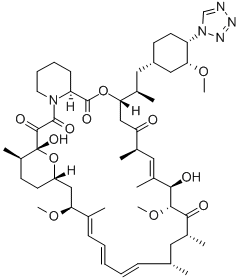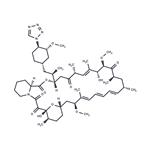Zotarolimus is a macrocyclic lactone immunosuppressant and a derivative of rapamycin . It binds to FKBP prolyl isomerase 1A (FKBP12; IC50 = 2.57 nM) and inhibits proliferation of human peripheral blood mononuclear cells (PBMCs), rat splenocytes, and human coronary artery smooth muscle cells (IC50s = 7, 1,337, and 0.8 nM, respectively). Zotarolimus has immunosuppressive activity in a one-way mixed lymphocyte reaction using human or rat lymphocytes (IC50s = 1.2 and 1,465 nM, respectively). It also reduces symptom severity in a rat model of experimental autoimmune encephalomyelitis (EAE; ED50 = 1.17 mg/kg per day) and delays cardiac allograft rejection in rats (ED50 = 3.71 mg/kg per day). Zotarolimus inhibits neointimal formation and reduces stenosis in pig coronary arteries when applied at 10 μg/mm to stainless steel balloon expandable stents with phosphorylcholine in a model of restenosis. Formulations containing zotarolimus have been used in drug-eluting stents in the prevention of restenosis following stent placement.
A tetrazole-containing Rapamycin analog as immunomodulator and useful in the treatment of restenosis and immune and autoimmune diseases.
Zotarolimus is a semi-synthetic macrocyclic lactone prepared from rapamycin by preparation of the 42-triflate ester, followed by displacement with tetrazole and purification of the two isomeric products. This structural change affords a less bioavailable product, a preferred profile for some applications. Like all tacrolimus analogues, zotarolimus binds to a receptor protein (FKBP12). The complex then binds to preventing it from interacting with target proteins. Zotarolimus is extensively cited in the literature with over 200 citations.
ChEBI: Zotarolimus is a macrolide and a lactam.

